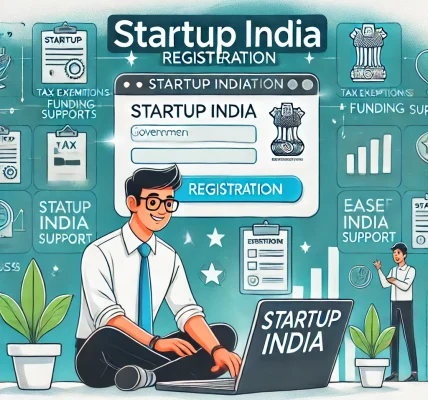Collateral-Free Loan Schemes for Small Businesses & Startups: Empowering Entrepreneurs with Financial Freedom
Starting and running a small business or startup comes with its own set of challenges, and one of the most prominent hurdles faced by entrepreneurs is securing funding. For many businesses, especially in the early stages, raising capital can be daunting, especially when traditional financing methods require collateral. This is where collateral-free loans come into play, offering a crucial lifeline for small businesses and startups to access funds without the need for physical assets as security.
In this blog post, we will explore the concept of collateral-free loans, the various schemes available for small businesses and startups in India, and how entrepreneurs can benefit from these financing options to fuel their growth.
What Are Collateral-Free Loans?
Collateral-free loans, as the name suggests, are loans that do not require the borrower to provide any form of security, such as property or assets, to secure the loan. These loans are primarily offered based on the creditworthiness of the borrower, the potential of the business, and the overall financial stability. Collateral-free loans are particularly beneficial for small businesses and startups, as they allow entrepreneurs to access funds without risking their assets.
Why Are Collateral-Free Loans Important for Small Businesses and Startups?
Small businesses and startups often face challenges when it comes to financing. Unlike established companies, they may not have valuable assets or a long credit history to offer as collateral. This makes securing traditional loans more difficult. Collateral-free loan schemes provide the following key benefits for entrepreneurs:
- Easy Access to Capital: With collateral-free loans, small businesses and startups can access funding quickly without the need to pledge valuable assets like property or machinery.
- Risk-Free Borrowing: Since there is no need to provide collateral, entrepreneurs can take financial risks without the fear of losing their personal or business assets.
- Boosts Innovation and Growth: Access to financing enables entrepreneurs to invest in innovative ideas, expand their businesses, and create job opportunities, which are critical factors in the growth of the economy.
- Encourages Entrepreneurship: The availability of collateral-free loans encourages more people to start businesses, knowing that they can access capital without facing stringent requirements.
- Financial Flexibility: These loans provide flexibility in terms of repayment schedules and interest rates, making it easier for businesses to manage their cash flow.
Government Schemes for Collateral-Free Loans in India
The Indian government, recognizing the importance of supporting small businesses and startups, has introduced several collateral-free loan schemes to make funding accessible to entrepreneurs. These schemes offer financial assistance to businesses without the requirement of providing physical security. Let’s take a look at some of the most prominent collateral-free loan schemes available for startups and MSMEs in India:
1. Pradhan Mantri Mudra Yojana (PMMY)
One of the most popular and widely used collateral-free loan schemes is the Pradhan Mantri Mudra Yojana (PMMY). Launched in 2015, this scheme aims to provide financial support to micro and small enterprises, especially those in the non-corporate, non-farm sector. PMMY is designed to promote entrepreneurship and provide access to finance for businesses that do not have collateral to offer.
Key Features of PMMY:
- Loans are categorized into three types: Shishu (up to ₹50,000), Kishore (₹50,001 to ₹5 lakh), and Tarun (₹5,00,001 to ₹10 lakh).
- Collateral-free loans are available for micro and small businesses, including startups.
- The loans can be used for working capital, equipment purchase, and business expansion.
Eligibility:
- Micro and small enterprises engaged in manufacturing, processing, trading, or service sectors.
- Startups, non-corporate enterprises, and individuals with a viable business idea.
How It Helps Startups: PMMY provides a much-needed financial boost to entrepreneurs, enabling them to grow their businesses without the burden of collateral. Startups can utilize these funds for working capital, setting up infrastructure, and expanding their product offerings.
2. Stand Up India Scheme
The Stand Up India Scheme was launched in 2016 with the objective of promoting entrepreneurship among women and Scheduled Castes (SC) and Scheduled Tribes (ST) communities. This scheme offers collateral-free loans ranging from ₹10 lakh to ₹1 crore for setting up greenfield enterprises.
Key Features of Stand Up India:
- Provides loans of ₹10 lakh to ₹1 crore.
- Focuses on promoting entrepreneurship among women, SC, and ST entrepreneurs.
- Loans are available for setting up greenfield enterprises in manufacturing, services, or trading sectors.
Eligibility:
- Women entrepreneurs, SC, and ST entrepreneurs who are starting a new business.
- The business should be in the manufacturing, services, or trading sectors.
- The applicant must have a good credit history and a viable business plan.
How It Helps Startups: This scheme provides significant financial support to underserved and marginalized communities, empowering them to start their own businesses. Women and individuals from SC and ST backgrounds can particularly benefit from this initiative to overcome the challenge of securing traditional funding.
3. Credit Guarantee Fund Scheme for Micro and Small Enterprises (CGS)
The Credit Guarantee Fund Scheme was introduced by the Ministry of MSME to provide collateral-free loans to small and micro enterprises. Under this scheme, the government provides a guarantee to banks and financial institutions that offer loans to MSMEs without collateral. This makes it easier for businesses to access funding without risking any physical assets.
Key Features of CGS:
- Provides credit guarantees to banks and financial institutions that offer loans to MSMEs.
- Collateral-free loans up to ₹2 crore are available.
- The government bears the risk of default, encouraging banks to lend to small businesses.
Eligibility:
- Micro and small enterprises with a good credit history.
- The business must be in the manufacturing, trading, or service sector.
How It Helps Startups: The CGS enables startups and small businesses to secure loans with minimal risk and no collateral. The scheme reduces the burden on entrepreneurs, allowing them to access much-needed capital to expand their operations and innovate.
4. National Bank for Agriculture and Rural Development (NABARD) – Kisan Credit Card (KCC)
NABARD’s Kisan Credit Card (KCC) scheme is designed to provide financial support to farmers and agricultural-based startups. While the scheme is primarily aimed at the agricultural sector, it also benefits agritech startups and businesses related to farming, food processing, and rural development. The KCC provides collateral-free loans for short-term working capital needs.
Key Features of KCC:
- Provides short-term loans to farmers, agritech startups, and agricultural businesses.
- Collateral-free loans are offered based on income generation potential.
- The funds can be used for purchasing agricultural inputs, equipment, and setting up small agribusiness ventures.
Eligibility:
- Farmers, agritech startups, and small agribusinesses.
- The applicant must be involved in the agriculture, food processing, or rural development sectors.
How It Helps Startups: Agricultural-based startups can access the funds they need to scale their businesses, invest in technology, and increase productivity without the need for collateral.
How to Apply for Collateral-Free Loans
Applying for collateral-free loans through these schemes is a simple and straightforward process. Here are the steps you need to follow to apply:
- Determine Eligibility: Review the eligibility criteria for the specific scheme you are interested in. Ensure that your business meets the requirements to qualify for the loan.
- Prepare a Business Plan: Prepare a solid business plan that outlines the purpose of the loan, how it will be utilized, and the expected outcomes. A well-structured business plan increases your chances of loan approval.
- Choose a Financial Institution: Depending on the scheme, you will need to approach a bank or financial institution that offers loans under that program. Most commercial banks, regional rural banks (RRBs), and microfinance institutions participate in these schemes.
- Submit the Application: Complete the application form for the respective loan scheme and submit the required documents, including identity proof, address proof, business registration details, and the business plan.
- Approval and Disbursement: Once your application is reviewed and approved, the loan will be disbursed, and you can begin utilizing the funds for your business needs.
Conclusion
Collateral-free loans are a game-changer for small businesses and startups in India. These loans provide entrepreneurs with the financial support they need to scale their operations, innovate, and create jobs without risking their personal or business assets. With various government-backed schemes like PMMY, Stand Up India, and the CGS, accessing funding has never been easier for small businesses.
By leveraging these collateral-free loan schemes, entrepreneurs can break through financial barriers and pave the way for a successful future. If you are a startup or small business owner, now is the time to explore these financing options and take your business to new heights.




